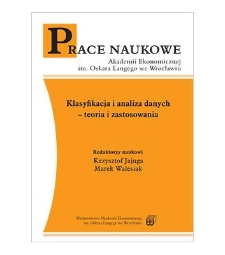Obiekt
Tytuł: Wnioskowanie na podstawie wiedzy wyrażonej ontologicznie - koncepcja środowiska
Tytuł odmienny:
Concept of Environment for Reasoning on Basis of Knowledge Expressed Using Ontologies
Autor:
Zygmunt, Anna ; Koźlak, Jarosław ; Valenta, Marek A.
Opis:
Prace Naukowe Akademii Ekonomicznej we Wrocławiu; 2005; nr 1064, s. 339-350
Abstrakt:
Wydawca:
Wydawnictwo Akademii Ekonomicznej im. Oskara Langego we Wrocławiu
Miejsce wydania:
Data wydania:
Typ zasobu:
Identyfikator zasobu:
Język:
Powiązania:
Prace Naukowe Akademii Ekonomicznej im. Oskara Langego we Wrocławiu; 2005; nr 1064 ; Pozyskiwanie wiedzy i zarządzanie wiedzą
Prawa:
Wszystkie prawa zastrzeżone (Copyright)
Prawa dostępu:
Dla wszystkich w zakresie dozwolonego użytku
Lokalizacja oryginału:
Uniwersytet Ekonomiczny we Wrocławiu
Źródło finansowania:
Tytuł publikacji grupowej:
Prace Naukowe Akademii Ekonomicznej im. Oskara Langego we Wrocławiu
Kolekcje, do których przypisany jest obiekt:
- Dolnośląska Biblioteka Cyfrowa > Zasoby > 2. Czasopisma > Czasopisma współczesne
- Dolnośląska Biblioteka Cyfrowa > Dziedziny nauki > 5. Nauki społeczne
- Dolnośląska Biblioteka Cyfrowa > Uczestnicy Konsorcjum > 04. Uniwersytet Ekonomiczny we Wrocławiu > Czasopisma wydawane przez Wydawnictwo UEW > Prace Naukowe Akademii Ekonomicznej we Wrocławiu
Data ostatniej modyfikacji:
29 gru 2024
Data dodania obiektu:
29 gru 2024
Liczba wyświetleń treści obiektu:
5
Wszystkie dostępne wersje tego obiektu:
https://dbc.wroc.pl./publication/168206
Wyświetl opis w formacie RDF:
Wyświetl opis w formacie OAI-PMH:
| Nazwa wydania | Data |
|---|---|
| Wnioskowanie na podstawie wiedzy wyrażonej ontologicznie - koncepcja środowiska | 29 gru 2024 |
Podobne
Valenta, Marek A. Zygmunt, Anna
Bieńkowska, Agnieszka Kral, Zygmunt Zabłocka-Kluczka, Anna
Bieńkowska, Agnieszka Kral, Zygmunt Zabłocka-Kluczka, Anna
Bieńkowska, Agnieszka Kral, Zygmunt Zabłocka-Kluczka, Anna
Bieńkowska, Agnieszka Kral, Zygmunt Zabłocka-Kluczka, Anna
Bieńkowska, Agnieszka Kral, Zygmunt Zabłocka-Kluczka, Anna
Bieńkowska, Agnieszka Kral, Zygmunt Zabłocka-Kluczka, Anna
Bieńkowska, Agnieszka Kral, Zygmunt Zabłocka-Kluczka, Anna
























